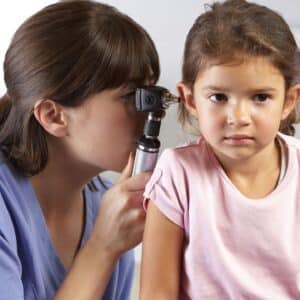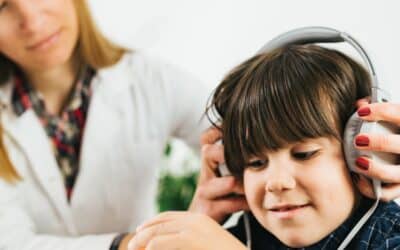Ear infections, although common in children, can be a source of distress for both the child and the parent. Fortunately, pediatric Ear, Nose, and Throat (ENT) specialists are here to help. In this article, we’ll explain the role of pediatric ENTs as it relates to childhood ear infections, including when it may be time to see a specialist and what to expect during a visit.
What is a Pediatric ENT?
A pediatric ENT, or otolaryngologist, is a medical specialist trained to treat disorders of the ear, nose, and throat in children. They have the skills, expertise, and experience to address the unique needs of young patients, from newborns to teenagers.
When to Take Your Child to a Pediatric ENT for Ear Infections:
While most ear infections can be treated by a general pediatrician, there are specific situations where the expertise of an ENT may be required:
- Frequent Ear Infections: If your child has more than three ear infections in six months or over four in a year, a specialist’s evaluation is advisable.
- Chronic Fluid Retention: When fluid persistently stays in the ear, even if infection symptoms are absent, an ENT’s assessment is beneficial.
- Hearing and Speech Concerns: Signs of hearing loss or delays in speech and language development may indicate an ear infection or continuous fluid in the middle ear, warranting an ENT consultation.
- Anatomical Considerations: Children with anatomical variations, such as a less inclined eustachian tube, are more prone to ear infections and may require an ENT’s expertise.

What to Expect During a Pediatric ENT Visit:
- Detailed Examination: The ENT specialist will use an otoscope to examine your child’s ear, assessing for signs of infection, fluid build-up, or any structural abnormalities.
- Hearing Test: An audiologist in the ENT’s office may complete a comprehensive hearing evaluation to check for any hearing concerns.
- Discussion about Treatment Options: Depending on the findings, the ENT might suggest:
- Antibiotics
- Pain relievers
- Myringotomy (the insertion of a tiny tube into the eardrum to drain fluid)
- Surgery for structural problems
- Watchful waiting with follow-up appointment
- Re-evaluation
- Advice on Prevention: The ENT specialist can provide advice on preventative measures for future infections. These may include tips on minimizing exposure to common colds and second-hand smoke, avoiding letting the child sleep with a milk bottle in mouth, and emphasizing the importance of thorough handwashing.
FAQs:
- Q: Can ear infections resolve on their own?
- A: Yes, many mild ear infections can resolve without treatment. However, it’s essential to consult with a pediatrician or ENT to determine the best course of action.
- Q: Are ear infections contagious?
- A: The infections themselves aren’t contagious, but the cold or flu that might lead to an ear infection can be.
- Q: How can I prevent my child from getting recurrent ear infections?
- A: Ensure your child is up to date with vaccinations, maintain good hand hygiene, avoid them sleeping with a bottle of milk in the mouth, and eliminate exposure to tobacco smoke.
Additional Resources:
- Ear Infections in Children: Information for Parents – HealthyChildren.org
- Ear Infections in Children, Babies & Toddlers | NIDCD (nih.gov)
- Ear Infection (Otitis Media): Symptoms, Causes & Treatment (clevelandclinic.org)
- Ear Infections in Children, Babies & Toddlers | NIDCD (nih.gov)
- Pediatric Otolaryngologist: Why Does Your Child Need to See One? (webmd.com)
Summary/Conclusion
In conclusion, while ear infections are common, they shouldn’t be overlooked. When indicated, a pediatric Ear Nose and Throat specialist can offer specialized care ensuring your child’s ear health and hearing are in the best hands. Consult with your child’s pediatrician to determine when a visit to an ENT is warranted.




0 Comments